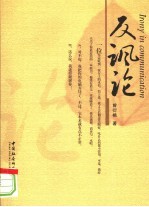

反讽论PDF电子书下载
- 电子书积分:9 积分如何计算积分?
- 作 者:曾衍桃著
- 出 版 社:北京:中国社会科学出版社
- 出版年份:2006
- ISBN:750045760X
- 页数:167 页
Chapter One A general description of irony 1
1.1 My understanding of irony 1
1.2 Pragmatic classification of irony 11
1.3 Pragma-linguistic forms to realize irony 13
1.4 Pragmatic strategies in ironic communication 14
1.5 Pragmatic forces of irony 15
1.5.1 Making criticism 15
1.5.2 Showing power 15
1.5.3 Saving face 17
1.5.4 Amusing 18
1.6 General framework of the study:scope,methodology and objectives 22
1.7 The use of the terms"speaker/hearer"and other Synonymous terms 24
Chapter two Previous accounts of irony:A review 26
2.1 Traditional semantic definition of irony 26
2.2 Logical refinement of irony definition 28
2.3 Grice's pragmatic refinement of irony description 31
2.4 Post-Gricean refinement of irony description 34
2.4.1 The echoic mention theory of irony 34
2.4.2 The pretense theory of irony 36
2.4.3 Resemblances and differences between the mention and pretense theories 38
2.5 Concluding remarks on the previous accounts of irony 39
Chapter Three Properties of ironic utterance 44
3.1 Properties embedded in ironic utterance 45
3.1.1 Indeterminacy and vagueness of ironical implications 45
3.1.2 Plurality of ironic interpretation 47
3.1.3 Extendibility of ironical implication 50
3.2 Pragma-psychological properties of ironic communication 53
3.2.1 Pragma-psychological context constituting irony 53
3.2.2 Pragma-psychological implication of an ironist's utterance 54
Chapter Four Mutuality:the precondition for ironic communication and cognition 58
4.1 Elements constituting mutuality 59
4.2 Necessity of mutuality in ironic communication 61
4.3 Possibility of establishing mutuality in ironic communication 69
4.3.1 Cues indicating mutuality 69
4.3.2 Mutuality decision criterion in ironic communication 73
4.4 Summary of Chapters Three and Four 77
Chapter Five Perception of counter-expectational mismatch as irony triggering 79
5.1 The echoism hypothesis——irony as echoic interpretation 80
5.2 The pretense hypothesis——irony as pretense 87
5.3 An alternative hypothesis——irony as counter-expectational mismatch 91
Chapter Six Irony:Misapplication of a critical evaluation 97
6.1 Irony as a critical evaluation 97
6.2 Irony as misapplication of a critical evaluation 100
6.3 Summary of Part Three(Chapters Five and Six) 106
Chapter Seven Irony cognition and its principle 111
7.1 The principle of irony cognition 111
7.2 Recognition of ironic implicatures 121
7.3 Recognition of ironic impression and attitude 127
7.4 A brief summary of Chapter Seven 130
Chapter Eight Irony understanding:Looking back and forward 131
Notes 135
Appendix 142
Bibliography 153
- 《中国后现代 先锋小说中的精神创伤与反讽》杨小滨著;愚人译 2013
- 《反讽及其理性 阿里斯托芬诗学研究》陈国强著 2009
- 《论反讽概念》(丹)克尔凯郭尔著;汤晨溪译 2005
- 《偶然·反讽与团结:一个实用主义者的政治相像》理查·罗逖著;徐文瑞译 1998
- 《反讽时代 形式论与文化批评》赵毅衡著 2011
- 《反讽的轨迹 西方与中国》陈安慧著 2017
- 《反讽四型 兼论新批评与中学语文文本细读》邹春盛著 2016
- 《反讽者说 当代文学的边缘作家与反讽传统 微光 青年批评家集丛》黄平著 2017
- 《轻盈地掠过现代性的泥淖 沈从文小说中的反讽意象和异域情调 英文》(意)焦石著;杨子琴译 2013
- 《巧合、悖谬、反讽 万比洛夫早期散文集萃》(俄)亚历山大·万比洛夫著;赵易生译著 2014
- 《朱墨集》陈殿桃著 2008
- 《超甜蜜魔女追追爱》凉桃著 2011
- 《忧伤的驯鹿国》顾桃著 2013
- 《幼儿教育思想》蔡秋桃著,金泽胜夫,下山田裕彦原著;雷群明编译 1995
- 《喵,就是选定你》凉桃著 2012
- 《锅炉运行技术问答》韩志成,曾衍锋,王海波等编著 2013
- 《教学做合一概论》白桃著 1933
- 《哇,妖怪都是美男呀》凉桃著 2013
- 《小病不求人》张步桃著 2009
- 《世界华文文学研究书系 王一桃卷》王一桃著 2006
- 《红色旅游的社会效应研究》吴春焕著 2019
- 《中国当代乡土小说文库 本乡本土》(中国)刘玉堂 2019
- 《社会学与人类生活 社会问题解析 第11版》(美)James M. Henslin(詹姆斯·M. 汉斯林) 2019
- 《异质性条件下技术创新最优市场结构研究 以中国高技术产业为例》千慧雄 2019
- 《中国铁路人 第三届现实主义网络文学征文大赛一等奖》恒传录著 2019
- 《莼江曲谱 2 中国昆曲博物馆藏稀见昆剧手抄曲谱汇编之一》郭腊梅主编;孙伊婷副主编;孙文明,孙伊婷编委;中国昆曲博物馆编 2018
- 《中国制造业绿色供应链发展研究报告》中国电子信息产业发展研究院 2019
- 《中国陈设艺术史》赵囡囡著 2019
- 《指向核心素养 北京十一学校名师教学设计 英语 七年级 上 配人教版》周志英总主编 2019
- 《《走近科学》精选丛书 中国UFO悬案调查》郭之文 2019
